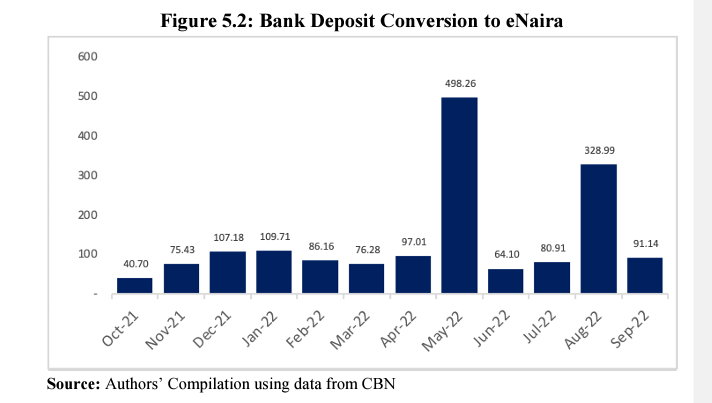Central Bank Digital Currency a Threat to Financial Stability — Nigerian Central Bank Study

Despite the role it has played in narrowing the financial inclusion gap, the e-naira central bank digital currency still poses a risk to financial stability. In addition to bolstering the financial inclusion rate, the central bank claimed that the CBDC would “widen the size and stability of banks’ deposit base.”
Nigeria’s Financial Inclusion Rates
According to a new Central Bank of Nigeria (CBN) study, the country’s nearly two-year-old e-naira central bank digital currency (CBDC) poses a risk to financial stability. This is despite the fact that such a digital currency can potentially help improve Nigeria’s “financial inclusion rate from 64.1 percent recorded in 2021 to the 95.0 percent target for 2024.”
Launched in late October 2021, the e-naira, which was championed by former CBN governor Godwin Emefiele, has not been widely received by the Nigerian population. As previously reported by Bitcoin.com News in August 2022, there were fewer than one million downloads of the e-naira app some twelve months after the CBDC was launched.
Many observers have argued that the number of downloads versus Nigeria’s 130 million plus adults may be an indication of the public’s less than lukewarm response to the CBDC’s launch. However, the Nigerian public’s apparent snub of the e-naira has not stopped the CBN from promoting it or offering incentives to prospective users.
Stabilizing the Banks’ Deposit Base
The deepening of financial inclusion is one of the key advantages the CBN has repeatedly highlighted when making the case for the CBDC. Similarly, in its report titled “Economics of Digital Currencies,” the CBN again discusses how the unveiling of the e-naira USSD code for non-smartphone users has helped to increase the number of e-naira transactions. In addition to bolstering the financial inclusion rate, the central bank claimed that the CBDC would “widen the size and stability of banks’ deposit base.”

However, despite these and other benefits that a CBDC will likely bring, the CBN states in the report that the conversion of bank deposits to e-naira may pose risks to the stability of the banking system. To back this argument, the report points to the number of bank deposit conversions since the introduction of the CBDC.
“Since its inception, bank deposit conversion to e-naira has exhibited an average monthly growth of 78.3 percent and totaled about N1.66 billion [$2.1 million]. Furthermore, e-naira in circulation as a ratio of average banking system liquidity has averaged 0.1 percent, reaching highs of 0.2 percent in each of the months of May and August 2022,” the CBN report noted.
According to the central bank, the e-naira can also negatively affect banks’ overall profitability via reduced non-interest income. A CBDC also comes with increased cyberattack risks, the CBN report said.
What are your thoughts on this story? Let us know what you think in the comments section below.